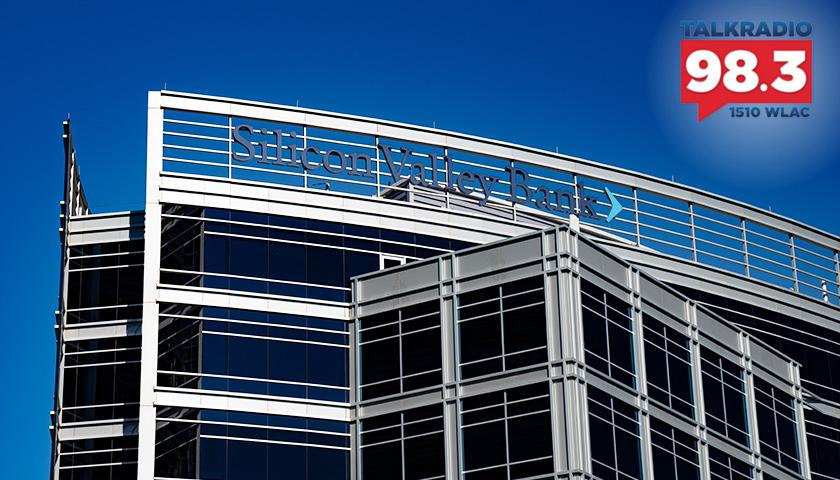Live from Music Row, Monday morning on The Tennessee Star Report with Michael Patrick Leahy – broadcast on Nashville’s Talk Radio 98.3 and 1510 WLAC weekdays from 5:00 a.m. to 8:00 a.m. – host Leahy welcomed the original all-star panelist Crom Carmichael to the studio for another edition of Crom’s Crommentary.
CROM CARMICHAEL:
Michael the goings on at SVB since last Thursday, I’ve tried to keep up with everything. And the latest is that the federal government through either the FDIC or the feds is going to make the depositors at SVB whole, that’s a wise thing to do.
They’re gonna do the same thing at Signature Bank. But what’s interesting is looking at it at the bigger picture because of Biden’s spending policies, the Fed finds itself in a Catch-22. What caused SVB to fail?
Now there were a variety of things, but one of the key things was SVB held about $20 billion in federal bonds. And they and those federal bonds went down in value as interest rates have gone up because that’s what happens to bonds. If you have a steep increase in interest rates, bonds will fall in value.
Even the highest grade bonds, because the interest rate on the bonds that SVB held was at maybe one and a half percent. And the federal bonds are now up at four and five percent. So the bonds are going to drop, and they had to sell those bonds in order to provide liquidity for depositors who are withdrawing their funds.
That’s what caused the collapse of SVB. Now the problem is that there is $30 trillion of federal debt and it’s climbing at the rate of a trillion dollars every six months. And so I don’t know how many other banks are holding a large number of federal bonds as opposed to t-bills.
Now, if you’re a bank and you own treasury bills, those are short-term in nature and the interest rates are whatever the current rates are. So you’re not at risk of losing your principal.
But SVB has that problem now. As the debt increases, the Fed believes that the only way to solve the inflation problem, which is a function of overspending is to raise interest rates. If they raise interest rates, they lower the value of the bonds in the banking portfolios across the country.
And Biden says that he’s not gonna negotiate on reducing spending by a penny. That’s what he said. And so the question is going be whether or not some of these other folks who have some brains, and I think there are a few people around Biden who have some brains that will try to convince him.
And we’re going to know in the next 60 days 90 days, whether or not he will negotiate to reduce spending in this fiscal year. And if he doesn’t, then you’re going to see the Fed continue to raise interest rates. You’re going to see bonds continue to fall in value. And you may have more banks that have problems. But the SVB deal is not done yet, and here’s why.
Banks of that size have what are called sweep accounts. What that means is if I’m banking at that bank and I have a line of credit at that bank and I have cash in my checking account, what the bank will do is it will sweep the cash out of my account every day and put it against my line of credit.
Then when I need the money, it takes the money out of the line of credit and puts it back in my account so I can spend it. The problem is its lines of credit have not been guaranteed. And I’m not saying that they should, but the lines of credit have not been guaranteed by the FDIC and the feds.
So there are a lot of banks like Silicon Valley Bank that don’t have any cash sitting in their demand deposit account to pay payroll. They did have a line of credit, but when the bank collapsed, the line of credit ceased to exist. And so there are still gonna be problems that come out of Silicon Valley Bank’s policies.
Now, the other thing that’s interesting is that Silicon Valley Bank, apparently right before the collapse, paid out bonuses to their executives, and some of their top executives sold stock in February right before the collapse. And so it’ll be interesting to see what happens.
One other thing about SVB is that if you type in DEI and SVB, you come to a webpage that says diversity, equity, and inclusion are their key principles. I will tell you that bankers have to be stodgy by nature, they just do, I would be a terrible banker because I’m too optimistic and I want to help people more than bankers. When I do private equity, I have a loss ratio that would kill a banker, but my successes outweigh the losses.
And so over time, it works out pretty well. But not if I were a banker. A banker has a loss ratio of at most, one-half of one percent. Now, that’s an amazing batting average. If you stop and think about it, that’s what they have to have.
But if you get into the business where you’re hiring because you wanna meet these Biden standards of diversity, equity, and inclusion, and they’re not good bankers, but yet they’re the ones responsible for making the loan decisions, then you’re gonna have results like SVB because banking is not business.
Listen to today’s show highlights, including this Crommentary:
– – –
Tune in weekdays from 5:00 – 8:00 a.m. to The Tennessee Star Report with Michael Patrick Leahy on Talk Radio 98.3 FM WLAC 1510. Listen online at iHeart Radio.
Photo “Silicon Valley Bank” by Tony Webster. CC BY 2.0.





